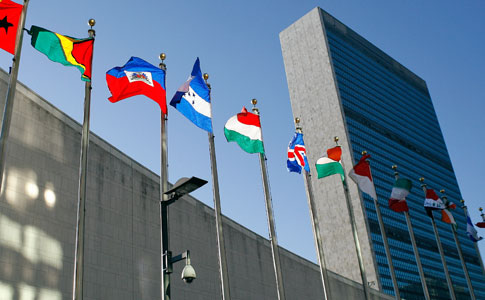As we approach 2015, the development agenda is becoming increasingly complex. The model for building the post-2015 sustainable development goals (hereafter SDGs) differs from that used to create the Millennium Development Goals. This time, the conventional intergovernmental negotiations have been preceded by a high level of civil society engagement. The UN’s sponsored World We Want project uses information from country consultations in 88 countries, the findings of 12 thematic discussions, as well as findings from internet surveys to map how civil society prioritizes these new goals. Understanding the dialogue surrounding the sustainable development goals can tell us something meaningful about the involvement of global civil society. With this new access, is civil society driving the conversation?
With all of this information comes the challenge of making sense of it. Some organizations have responded to the challenge of greater civil society engagement by trying to summarize the conversation. The Overseas Development Institute’s Future Goals Tracker tracks who is making proposals for the SDGs. A similar effort is led by the Stakeholder Forum’s E-Inventory. The North-South Institute uses data from the Future Goals Tracker to assess the relative count of different proposed themes for the post-2015 development agenda, and NSI has released a more extensive report evaluating some of these proposals. The World We Want project also has a number of different data visualization tools to summarize the discussions on the website and through social media.
For someone interested in the politics of these discussions, these are a rich resource to understand who is leading the conversation regarding the SDGs. As an initial appraisal, I downloaded the data from ODI’s Future Goals Tracker and have summarized it below. The website contains 367 proposed goals disseminated between 2009 and 2014. The goals are categorized by who is proposing, the country of the proposer, and what the proposal actually was. Some of the proposers are classified as country specific, such as an NGO operating in a specific country or a government, and others are classified as global, representing an NGO with global reach or an international organization. Some key findings follow below.
- Proposers had limited global reach. There were 202 proposals from 28 countries in the dataset. Over half of the proposals (N=114) came from proposers based in the US and UK, and 79% (N=161) of the proposals came from countries classified by the World Bank as ‘high income.’ In the top ten proposing countries, there are only three classified as middle income: Philippines (11 proposals), Colombia (10 proposals) and China (3 proposals).
- Strong civil society presence. At the country level, 86% (N=173) were proposed by civil society organizations based in specific countries. At the global level, 31% (N=51) were proposed by civil society organizations. In sum, 61% (N = 224) of the proposals in the Future Goals Tracker were made by civil society organizations at either the country or global levels.
- Significant UN engagement. The SDGs are engaging numerous UN agencies. At the global level, the majority of global proposals are made by UN agencies, other international organizations that are part of the UN system, or multistakeholder partnerships in which the UN plays a considerable role. 62% of these global proposals (N=102) came from UN and UN related agencies. This is in addition to the UN’s role in channeling civil society debate through the aforementioned World We Want Project. The 12 thematic summaries from the World We Want project are not included in the above total.
Of course, it is too early to make statements about the relative impact of civil society on the SDGs. This is a process that has yet to fully play out. It is clear from the above findings, however, that while civil society is an active partner, we have a long way to go to make the conversation about the SDGs a truly global one.

[…] here to read the full […]